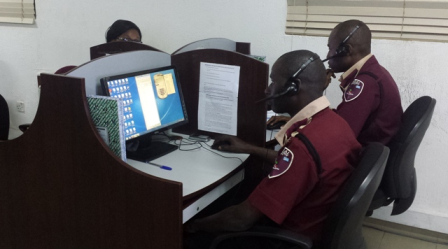There has always been something different about the Federal Road Safety Corps when compared to all the other uniformed forces on our roads in Nigeria. Something about them makes us road users a bit more wary when we are stopped by one of their teams. We know that this may not be one of those situations that we can get out of with a N100 bribe as we have all become accustomed to. Yes, some of it may still be related with the organisation’s unique history, with Professor Wole Soyinka as its first Chairman and Olu Agunloye as the first Corps Marshal. But this cannot possible explain its ethos 20 years later. Why is this? I visited Mr Osita Chidoka, the current Corps Marshal, at the Head Offices of the Federal Road safety Commission in Abuja to find out.
The first surprising point that he shared with me was that about 30% of all the work they do is on rescue; this has even surprised him. In the North East, this is almost all they do. The FRSC manages a fleet of ambulances across the country and is often the first agency at accident sites. They manage the evacuation of the wounded the best they can and contact relatives. Mr Chidoka explained that he has been trying hard (with only limited success) to work with Accident and Emergency centres in our public sector hospitals. When I asked him why the health sector does not seem to be coming to the table on this, his remark seemed conservative.
“We have gone as far as installing hotlines in Accident and Emergency Rooms of key hospitals across the country so that we can communicate with them during emergencies, but these often go unanswered”
Communication is critical to the work they do, and I was amazed at what I saw in the control room of FRSC. On a large touch screen, we could monitor in real time all FRSC patrols cars, including ambulances across the country. It was easy to see those moving and those that were stationary. They all had GPS devices installed in them that sent back live signals to HQ. With a few clicks, Mr Chidoka could show me all the accidents that had happened today, in the last week and last month, the areas with the largest concentration of accidents and how that was driving their enforcement activities in those areas. You may be surprised to hear that Abuja has one of the highest accident rates in the country, despite having the best roads and the newest cars. What does this tell us? That until we have a governance framework that regulates how we drive, the improvement in road infrastructure will lead to many mortal “side – effects”.
I pushed him harder on what his team is doing about driver behavior. He replied that achieving good driver behavior is their ultimate goal and most difficult challenge. He explained the approach which he and his team have been working with for many years. Achieving this is the major driver for the changes being implemented with the new drivers’ licenses and vehicle registration plates that have caused a lot of public outcry and lawsuits lately. The FRSC has made a significant investment in complex IT infrastructure that brings together information on the licenses, cars and roads. Running on SAP, the new driver’s license and Vehicle registration plate has enabled an environment where traffic offenders and offending vehicles can be identified and tracked. With this in place FRSC is currently piloting a speeding fine system which will lead to drivers getting points on their licenses and more severe punishment for serial offenders. Already, every FRSC team across the country has a hand-held device with which data is collected from offenders and immediately stored in the database.
But, is it really possible to change driving behavior in Nigeria, I asked Mr Chidoka. He replied that, a few years ago, it appeared impossible to insist that one must be strapped unto the seat with a seatbelt or that motorcyclists must wear helmets, but these have changed significantly. It is now a rare exception to see someone in a car without seatbelt or on a bike without helmet. If Mr Chidoka can achieve a change in driver behavior for the better, he will leave a lasting legacy for Nigerians. But, in order do this; he will need Nigerians to work with him. There is no other country in the world where people drive the way we drive in Nigeria. One area that is completely befuddling in the 21st century is the complete absence of enforcement around drink driving. Most commercial parks in Nigeria double as centres for bars and restaurants for all classes in society. Very few Nigerians would recognise a breathalyzer if they saw one. We are our own worst enemy.
Meanwhile, we hope that FRSC can get back to their work of prevention and enforcement and the role of rescue diminishes. For us in the health sector, we must find a way of working together with FRSC to complete the loop of preparedness and response between the accident site and the emergency rooms. While FRSC may have excellent ambulances and personnel trained in first aid, we will continue to lose many of our best until we understand how an accident and emergency department should really work. At the moment, there is none in Nigeria. Is that the missing link? Maybe the data that FRSC generates can demonstrate this.




